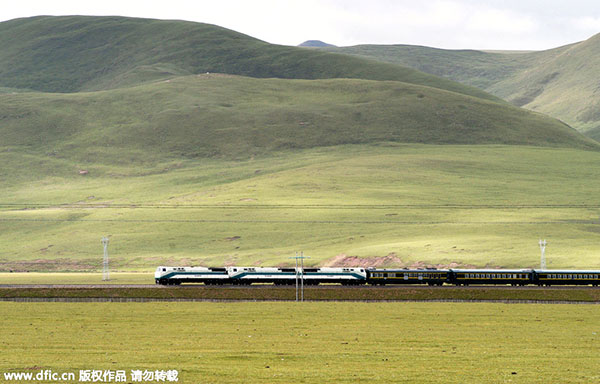 |
| The Qinghai-Tibet Railway [Photo/IC] |
On the occasion of the 50th anniversary of the establishment of the Tibet autonomous region, the Qinghai-Tibet Railway has also been wholly opened to traffic for nine years. As the longest railway with the highest altitude in the world, what has it contributed to the development of Tibet?
The opening of the whole Qinghai-Tibet Railway on July 1, 2006 ended Tibet’s history of having no access to train. With a total length of 1,956 kilometers, the Qinghai-Tibet Railway extends from Xining, capital of Qinghai Province in the east to Lhasa in the south. By July 31 this year, the accumulated quantity of passengers and freight transported by the railway increased from 6.482 million persons per time and 2.491 million tons in 2006 to 12.748 million persons per time and 54.724 million tons in 2014.
Strong impetus to local economic development
Before the opening of the Qinghai-Tibet Railway, the transportation of passengers and goods to and from Tibet mainly depended on highway and aviation, suffering from huge pressure. As a landmark project of China’s implementation of the Western Region Development Strategy, the opening of the whole Qinghai-Tibet Railway thoroughly broke the long-term transport bottleneck restricting Tibet.
Jie Qing, head of Lhasa Station of the Qinghai-Tibet Railway Company, said: "All the goods and materials transported by the railway to Tibet will be sent to Lhasa West Railway Station, including oil products, building materials, grains, fertilizer and food. In 2014, Lhasa West Railway Station handled 4.327 million tons of freight."
Thanks to the strong freight capacity, low transport price and convenient transport mode of the Qinghai-Tibet Railway, the transport cost of Green Barley Beer, mineral water of the plateau, yogurt, yak meat and ethnic handicrafts to the hinterland has been reduced significantly…More and more specialties of Tibet have been transported to the hinterland by the railway and sent to the world. After the opening of the Qinghai-Tibet Railway, the average annual growth rate of Tibet’s GDP from 2006 to 2014 exceeded 10 percent.
Fu Yushou, director of the Railway Office of Tibet autonomous region, said: "The Qinghai-Tibet Railway has greatly contributed to the economic development of Tibet and become a ‘booster’ for the healthy and rapid development of Tibet's economy."
Tibetan farmers and herdsmen increase their incomes
August is a peak period for tourism in Tibet. Tsering Yangkyi from Sam Village in Newu Township lives near the Lhasa Railway Station. She has been terribly busy recently. "Trains of the Qinghai-Tibet Railway pass by my house. A few years ago, my husband and I ran a family hostel in the spare rooms of our house. The rooms are hard to get in the peak period for tourism now," said she.
Today, there are over 50 such family hostels and farmers home inns near Lhasa Railway Station, attracting large numbers of tourists and citizens from Lhasa coming to spend leisure in the peak period for tourism. The farms and herdsmen along the Qinghai-Tibet Railway have takenthe "railway business opportunity". Only Naiqung Township of Tohlung Dechen County has had over 60 additional jobs for stevedores, transport drivers, cleaners, with a percapita income increase of about 249.2 dollars.
Large numbers of quality and cheap goods have been transported to Tibet via the Qinghai-Tibet Railway. The prices of such necessities for life as grains, vegetables, fruits and fuel and such durable consumer goods as refrigerator, color TV and washing machine have declined, thus reducing the household consumption expenditure and improving Tibet People's production and living standards.
In the past, restricted by traffic conditions, the milk, yogurt,cottage cheese and other products of farmers and herders in Nagqu County couldn’t "go too far". "After the opening of the Qinghai-Tibet Railway, the yogurt of our cooperative is sold in Lhasa and Golmud," said Konchog, principal of the Dzong Farmers and Herdsmen Cooperative in Nagqu County. "The transport cost of railway is lower than that of highway and the loss has also been greatly reduced." He is of some renown in the local place.
Snowy plateau is longer far away
The Qinghai-Tibet Railway passes many famous scenic areas such as the Qinghai Lake, Kunlun Mountains, Hoh Xil and Northern Tibet Grassland, forming a world-class tourist route full of mysterious flavor.
Before the opening of the Qinghai-Tibet Railway, restricted by traffic conditions, the huge tourist resources were yet to be developed.
Over the past nine years, Tibet’s tourism has seen "blowout-type" development and become a pillar industry. Tibet has received all together 74.183 million domestic and foreign tourists. The number of tourists to Tibet soared from 1.8 million in 2005 to 15 million in 2014, and the tourism revenue increased by more than ten times from over 322.2 million dollars in 2005 to 3.389 billion dollars in 2014.
Regional transportation increasingly improved
After the opening of the Qinghai-Tibet Railway, Tibet has formed a three-dimensional transportation pattern with common development of railway, highway and aviation.
In August last year, Lhasa- Shigatse Railway was opened to traffic, shortening the time of transportation between the two largest cities in Tibet from six hours by highway to two hours and 59 minutes by railway. August 15 this year marked the first birthday of the railway. According to the statistics of the Qinghai-Tibet Railway Company, by July 31 this year, it had delivered 626,500 passengers and 65,000 tons of goods.
In June this year, the Lhasa- Nyingchi Railway was built in full swing, extending the "heavenly roa" in Tibet. As the first electrified railway in Tibet, it will extend 435 kilometers from Lhasa to Nyingchi, with a total construction period of seven years.
"The constantly extending railway network of the Qinghai-Tibet Railway will surely bring about a new transportation pattern in Tibet and make it more and more confident to achieve healthy and rapid economic and social development of Tibet," said Zhang Jianzhong.
Related Stories